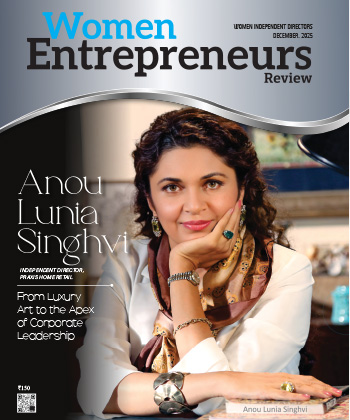
Shattering Barriers: Women Leaders Revolutionising Logistics Real Estate
By: Priya Mathias, Executive Vice President, IndoSpace
Priya Mathias, Head of Marketing and Communications at IndoSpace, leads brand, marketing, media, and digital transformation for India's largest industrial and logistics real estate platform. With over 20 years of experience, she excels in B2B and B2C marketing, media relations, and stakeholder engagement, enhancing market visibility and reputation.
Discussions often revolve around the concept of a glass ceiling impeding women's career advancement. However, it’s crucial to realize that this barrier isn't impenetrable—it can be shattered with dedication and determination. Specifically in industrial and logistics real estate, the challenge extends beyond just breaking through the ceiling; it involves overcoming preliminary barriers and initial hesitations women face when entering this field.
Hesitation Stems from Misperception
Every industry presents its own set of challenges, and oftentimes, it is our perceptions or misperceptions that foster hesitation towards pursuing certain careers. In real estate, especially industrial and logistics real estate, for example, there is a common misconception that the field primarily consists of land brokers and sales agents. I’ve found it difficult to convey to friends and family that the sector encompasses far more, ranging from investment, design, marketing, project, facility management, and operations to HR and legal. Such misunderstandings may particularly deter women from considering a career in this industry.
Contrary to popular belief, the presence of women in this sector is increasing. With my years of experience across real estate in residential, commercial, and now industrial and logistics, I've seen surge in women employees in the last 15 years, not just in in sales but across functions, including architecture, facility management, ESG, marketing, design, human resources, and legal roles.
Women in real estate today are driving innovation, revenue generation, competitiveness, and sustainability, making them essential engines of development. To confidently embrace leadership roles, women must recognize their strengths and capitalize on them.
Steady but Certain Progress on the Path to Inclusivity
In the past decade, the number of women entering this industry has been steadily rising. The workplace environment is also evolving to become more supportive, allowing individuals to help each other—though much progress remains to be made for achieving comprehensive support.
When I began my real estate career, I faced common challenges that everyone experienced. Tackling these issues head-on and showing your problem-solving skills will earn you well-deserved respect.
As a proponent of inclusivity, it's crucial to recognize that real inclusivity involves anticipating equal treatment, not special favors. Authentic progress occurs when both men and women are treated equally.
When working closely with male colleagues and potential tension arises from my assertive requests, I explain our common goal and the reason behind my requests, clarifying that I won't apologize for seeking what's necessary. This approach successfully sets expectations, diffuses tension, and achieves the desired results.
What it Takes for Women to Lead, and Succeed – Authenticity and Commitment
Entering any industry requires appropriate qualifications, but they alone are insufficient. During the hiring process, I emphasize on a candidates' attitude – of being authentic. To be a good leader or teammate, it's important to feel comfortable expressing emotions and asking for help. This vulnerability improves communication and helps you form stronger connections with supervisors, colleagues, and employees.
Both men and women are committed at work, but women often blame themselves more when things don’t go as planned. Men tend to move past mistakes quickly, while women may stress over them. I had to train myself to see commitment as perseverance, focusing on hard work, learning, and preparing for future challenges.
Though women are widely seen in departments like Legal, HR, and Marketing, their presence diminishes in senior executive or operational roles such as project and site leadership. The challenge is not about women's ability to handle traditionally male-dominated tasks—they are equally competent. The real issue is the male dominance in these positions and the importance of bridging the representation gap and breaking down stereotypes that cause this imbalance.
The Balancing Act
Research suggests that men speak for 75% of the time in decision-making groups. Women are interrupted 50% of the time, i.e. every other time they speak. And 69% of speakers at conferences worldwide are male.
Societal biases often paint assertive men favorably while viewing the same trait in women as overly emotional. Therefore, it’s imperative to strike a balance between assertiveness and politeness, especially in boardroom interactions; staying fearless and focussed. It is important to remain gutsy, embrace change, and dare to be different, yet be logical and ever willing to take risk and full ownership.
At the beginning of my real estate career, I was advised that showing emotions at work would be a liability and make me appear weak. Although I might have accepted that advice back then, I now realize how absurd it truly was. Women often have the advantage of being empathetic, and it's wise to use this as a strength. Emotional intelligence (EQ) is arguably just as important as IQ for leaders.
Work-life balance is often viewed as a major obstacle in this industry. What’s important is to give 100% to everything you do – work or personal, and to set aside time for yourself, your hobbies, or health and fitness activities. I have been fortunate to have experienced working at companies where ‘work’ and ‘life’ are completely integrated. Where my work friends became (and still are) my good friends. Where I woke up in the morning happy and excited to hang out with them and do amazing work together. A place where it wasn't work anymore, it was more like a family. This experience was extraordinary and fundamentally altered my understanding of 'work-life balance' — revealing there is neither balance nor separation. But more profoundly there is a world where they can become the same.
Most Viewed
- 1 Women's Health Startup HerMD Closing Doors Amid Industry Challenges
- 2 5 Famous Women in Indian Armed Forces
- 3 Saudi Women No longer Require Male Permission for Clothing Choices, says Prince MbS
- 4 Kolkata Medtech Startup Innovodigm Raises Rs 5.5 Crore Seed Funding Led by IAN Group
- 5 Yamunanagar's Kashish Kalra Honoured after Securing 111th Rank in UPSC Civil Services Exam
- 6 Madurai Appoints Its First Woman Corporation Head
- 7 IAS Vijayalakshmi Bidari Appointed as the new Nagpur Divisional Commissioner
- 8 American Entrepreneur Lucy Guo Overtakes T Swift to become Youngest Female Billionaire
- 9 ICC Women's World Cup 2025 Trophy Showcased at Indore's Holkar Stadium
- 10 Aparna Saxena's Beauty Venture AntiNorm Launches in India
- 11 Vidya Nataraj Co-Founded BlueStone Jewellery & Lifestyle files IPO
- 12 5 Women Freedom Fighters of India
- 13 Dr. G Krishnapriya appointed as CEO for Trichy
- 14 M3M & Sirona Partner to Introduce Menstrual Hygiene Vending Machines in 15 Locations
- 15 Punjab Govt launches SHE Cohort 3.0 Supporting Tech-led Women Startups
- 16 Indian origin Lawyer, Sweena Pannu appointed as the US New Superior Court Judge
- 17 The Aurora Tech Award recognizes 4 Indian Women-led Startups
- 18 Kerala's Republic Day parade featured an all-female tableau
- 19 Manisha Kabbur Becomes Karnataka's First Woman International Karate Coach
- 20 Director K. S. Ravikumar's Daughter Maalica Ravikumar Launches Life Coaching Company 'Evergrowth Academy' for Women
- 21 Leezu's Raises Pre-Seed Funding to Accelerate Growth in Sexual Wellness Industry
- 22 Sattu: Super-easy summer drink for PCOS gut healing
- 23 Swathi Nelabhatla creates Sitha App, India's First Women-Exclusive Gig Platform
- 24 7 Timeless Female Kathak Dancers & their Iconic Legacies
- 25 Meet 7 Iconic Women Architects of Modern India & their Most Impactful Work
- 26 This Woman-led Insuretech Startup is Helping Bridge the Education Financing Gap in India
- 27 Women Leaders Share Lessons Learnt from India Women's WC Win
- 28 5 Enterprising Women Founders Powering Singapore's Tech & Innovation Landscape
- 29 4 Women. 4 Stories. One Vision for Smarter, Stronger Healthcare
- 30 Global Gender Gap Narrows to 68.8%, But Full Equality 123 Years Away: WEF Report 2025
- 31 Changemakers: 7 Women Entrepreneurs Taking the Make in India Movement Forward
- 32 Meet Lucy Guo, The Youngest Self-Made Female Billionaire Disrupting Tech
- 33 How Women are Driving India's Festive Online Shopping Surge






